Who is winning World Bank contracts? A breakdown of trends from 2017-2020
Devex's latest analysis of the regions, sectors, and organizations funded through World Bank contracts finds that transportation, water and sanitation, and energy still top the list.
Nearly 3,000 member country delegates are attending the World Bank’s 2021 Spring Meetings this month. For the second time, the event is being held virtually due to the COVID-19 pandemic. Last year, the bank focused on the health crisis, pledging up to $160 billion — to be disbursed through this June — to support countries’ responses. In October, it further approved $12 billion for vaccine finance. This year’s focus is international development, including issues of debt, economic recovery, vaccines, and climate. While the issues under discussion are diverse from a procurement perspective, the key sectors financed by World Bank capital continue to relate mostly to infrastructure, with transportation, water and sanitation, and energy topping the list. Devex has regularly analyzed funding in World Bank contracts for regions, sectors, and organizations. This article looks at what has happened since the publication of a previous analysis covering the 2006-2016 period. A dip in contracts: What happened in 2020? The data analyzed here comes from the World Bank’s database of major contract awards, which includes contracts subject to the bank’s prior review — before procurement. Normally, it excludes those that are subject to the bank’s review after procurement. For 2020, these represent approximately 55% of the institution’s total contracting that year, according to the bank. Across the four years Devex examined, the World Bank procured 13,104 major contracts — mostly through recipient government executing agencies — worth $40.9 billion in total. There was a slight decrease in contract spending and major contracts procured after 2017, from $11.4 billion for 4,278 awards that year to $10.9 billion for 2,910 awards in 2019. A significant dip in value of 27.5% was seen in 2020, with only $7.9 billion disbursed for 2,776 awards. This decrease in the contracts analyzed — reviewed before procurement — can be explained by both the 2016 procurement reform effects on prior review and the fast-track emergency procurement mechanisms the bank implemented during the pandemic. Transportation, water and sanitation, and energy remain priority sectors Though there are a total of 11 sectors across the 2017-2020 contract awards, nothing changed in the bank’s sector priorities, which are still comparable to those in the 2006-2016 analysis. Contract spending is still heavily focused on transportation, water and sanitation, and energy. From 2017 to 2020, the transportation sector received 27%, or $11 billion, of the bank’s annual contract spending. This was followed by water and sanitation with 23%, or $9.6 billion, and energy and extractives with almost 22%, or $8.8 billion. Since 2018, contract spending in transport has decreased. In 2019, the allocation declined by 38%, amounting to $2.5 billion, with the biggest chunk — $199 million — awarded to China Road and Bridge Corp. for the Dakar Bus Rapid Transit Pilot Project in Senegal. The sector’s contract spending continued to decline in 2020, receiving $1.7 billion. Social protection accumulated 6%, or $2.5 billion, of 2017-2020 contract spending. The health and social sector got 5%, with $2.1 billion, as did agriculture, with $2 billion. Industry and trade services received 3%, or $1.4 billion, while other sectors received smaller proportions. Civil works still dominate procurement categories At $26.7 billion, civil works received more than half of the bank’s contract spending over the four-year period, with projects in South Asia getting $8.7 billion. The contracts revolved around five procurement types: building, industrial plants, infrastructure, installation, and maintenance and rehabilitation. Chinese, Indian, and Turkish contractors dominated this category, winning a combined $15.5 billion in awards. Chinese contractors won $9.1 billion across the four years, with the state-owned construction and engineering company China Gezhouba Group getting six civil works contracts, worth $2 billion in total. The procurement of goods and equipment saw $7.3 billion in total spending. Chinese suppliers also led this category, receiving $2 billion. Meanwhile, nonconsulting services — including translation, satellite imagery, and event management services — were allocated $1.3 billion for 532 contracts. The biggest chunk of procurement spending, at $199.4 million for 15 contracts, went to several United Nations agencies, such as the Office for Project Services, World Health Organization, and World Food Programme. Although it came third in terms of contract spending, consultant services got more than half of the total number of awards: 7,000 contracts worth $5.6 billion, or 13.7% of the value of all contracts. Among these, 2,209 were tagged as individual consultancies, worth $234.2 million altogether. The services procured by the bank varied greatly, but among the most awarded were construction supervision and technical services, project management, and training services. By origin of suppliers, Afghanistan saw the most contracts, receiving $784 million for 194 contracts across the four years. Bakhtar Development Network — an Afghan nongovernmental development organization — received the largest portion, worth $97.9 million for nine contracts. Geographical breakdown of contracts The geographical distribution of the bank’s contract spending continues to be diverse, with more than 140 countries represented. From 2017 to 2020, the African region saw the highest value of contract awards at $12.6 billion, or 30.8% of the value of all contracts. South Asia followed at $11.5 billion, or 28.1%. However, South Asia received more financing in 2017 and 2020 due to contracts awarded in Pakistan under two hydropower projects. Third in the ranking is the combination of Europe and Central Asia with $7.6 billion, or 18.6%. This is followed by East Asia and the Pacific with $4.3 billion, or 10.5%; Latin America with $2.5 billion, or 6%; and the Middle East with $2.2 billion, or 5.6%. From the country-level point of view, India outranked all others during the four-year period, receiving $4.9 billion. This was followed by Pakistan with $2.9 billion and China with $1.9 billion. Contracts still go to local suppliers — but with less value Across all the years analyzed, local suppliers were preferred over foreign counterparts. A total of 8,036 contracts were awarded locally — that is, to contractors based in the recipient countries — while 5,068 contracts went to nonlocal suppliers. But in terms of the value of the contracts, the bigger chunk went to nonlocal contractors at $23.1 billion, compared with $17.8 billion to local contractors. Chinese contractors top the ranking with 28%, or $11.4 billion, of total contract spending between 2017 and 2020. Over 80% of their funding, or $9.5 billion, was for projects outside China. Indian contractors followed with $5.8 billion for 698 projects. Almost 80% of their contract financing, or $4.6 billion, targeted the implementation of projects in India. Update, April 12, 2021: This article has been updated to clarify that 80% of contract financing awarded to Indian contractors targeted the implementation of projects in India. For access to in-depth analysis, insights, and funding opportunities from over 850+ sources — combined with Devex Pro news content — sign up for Pro Funding or get in touch to learn about our Pro Funding group options.
Nearly 3,000 member country delegates are attending the World Bank’s 2021 Spring Meetings this month. For the second time, the event is being held virtually due to the COVID-19 pandemic. Last year, the bank focused on the health crisis, pledging up to $160 billion — to be disbursed through this June — to support countries’ responses. In October, it further approved $12 billion for vaccine finance.
This year’s focus is international development, including issues of debt, economic recovery, vaccines, and climate. While the issues under discussion are diverse from a procurement perspective, the key sectors financed by World Bank capital continue to relate mostly to infrastructure, with transportation, water and sanitation, and energy topping the list.
Devex has regularly analyzed funding in World Bank contracts for regions, sectors, and organizations. This article looks at what has happened since the publication of a previous analysis covering the 2006-2016 period.
This story is forDevex Promembers
Unlock this story now with a 15-day free trial of Devex Pro.
With a Devex Pro subscription you'll get access to deeper analysis and exclusive insights from our reporters and analysts.
Start my free trialRequest a group subscription Printing articles to share with others is a breach of our terms and conditions and copyright policy. Please use the sharing options on the left side of the article. Devex Pro members may share up to 10 articles per month using the Pro share tool ( ).
Janadale Leene Coralde works as a contributing analyst for Devex. Based in Manila she reports on development donors activities and designs funding data visualisations. She has a degree in political economy, specializing in international relations and development, and has previously worked as a researcher for Chemonics, the REID foundation, and the Philippines House of Representatives.
Miguel Tamonan is a Senior Development Analyst at Devex, where he analyzes data from public and private donors to produce content and special reports for Pro and Pro Funding readers. He has a bachelor’s degree in Political Science with a Major in International Relations from the Polytechnic University of the Philippines.









